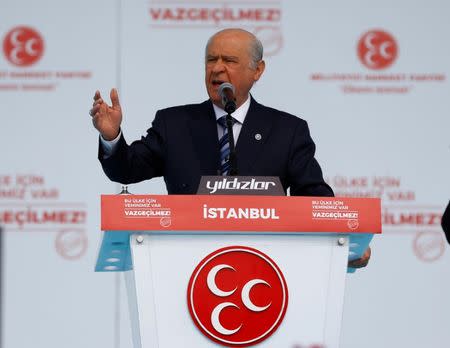Turkey's ruling party to discuss call for early election
By Ercan Gurses and Gulsen Solaker ANKARA (Reuters) - Tayyip Erdogan's ruling party will discuss the possibility of holding Turkey's presidential election in August, more than a year earlier than planned, the government spokesman said on Wednesday, following a suggestion from its nationalist allies. The government had repeatedly dismissed the prospect of an early election. Erdogan, the president, last year narrowly won a referendum to change the constitution and create an executive presidency. However, those extended powers are not due to take effect until after presidential polls, now slated for November 2019. "The party's official institutions will make an evaluation and a statement will be made afterwards," Deputy Prime Minister Bekir Bozdag, the government's spokesman, told reporters. The leader of the small MHP nationalist party, currently in opposition but expected to form an alliance with Erdogan's AK Party in parliamentary polls, also slated for November 2019, had said it would be difficult for the country to "endure current circumstances" until then. He pointed to risks to Turkey including the economy and possible increases in migration into the country. Erdogan said he would meet MHP leader Devlet Bahceli on Wednesday. Erdogan also said that the constitutional change would be fully implemented with the November 2019 elections - possibly hinting that early polls were not on the cards. Following Bahceli's comments, Turkey's lira weakened to 4.1103 by 0941 GMT, from 4.0865 beforehand. The Borsa Istanbul main stock exchange index fell more than 2 percent. 'TURN FOR WORSE' Some investors have been factoring in the prospect of early elections, citing the difficulty of the government keeping the economy going at its current breakneck pace - it expanded at 7.3 percent in the fourth quarter - until late next year. "It is going to be increasingly difficult to sustain the currently high growth rates until November 2019, when presidential/parliamentary elections are scheduled," Eurasia Group's Naz Masraff said in a note to clients this week. "Early elections are, therefore, likely later this year (60 percent likelihood) before the economy takes a turn for worse." Erdogan, an economic populist and a self-described "enemy of interest rates", wants to see cheaper bank loans and more credit growth to fund big construction projects and boost the economy ahead of the elections. He has lashed out at international investors over a sell-off in the lira, which has hit a series of record lows and is down some 7 percent this year. Economists say the decline reflects entrenched wage growth and inflation, and interest rates must rise to arrest its fall. "Turkey has a government that has failed domestically and internationally," Bulent Tezcan, the spokesman for the main opposition CHP party, said in response to Bahceli's call. "Serious economic troubles have come to our doorstep. The fire of the exchange rates won't die." The Iyi Party, a smaller, nationalist party that broke off from Bahceli's MHP, said it would welcome early elections and was ready to field its candidate for president, former interior minister Meral Aksener. (Additional reporting by Ezgi Erkoyun and Ali Kucukgocmen; Writing by Ece Toksabay and David Dolan; Editing by Dominic Evans and Kevin Liffey)



